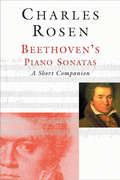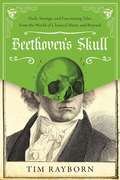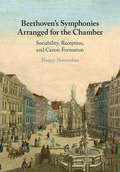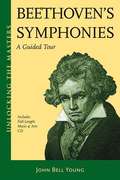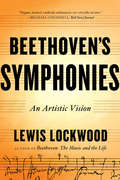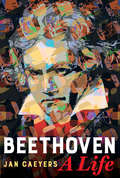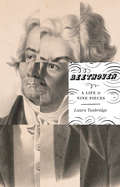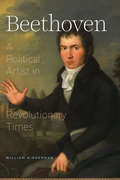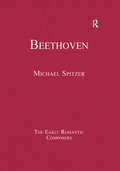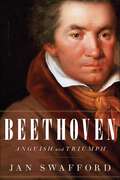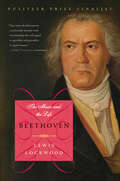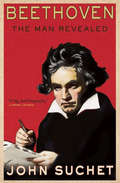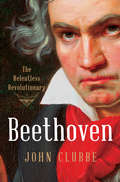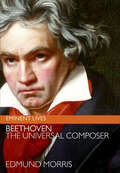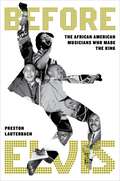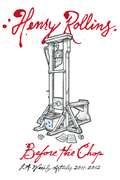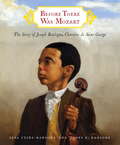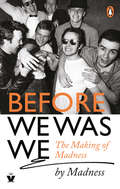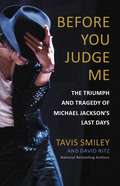- Table View
- List View
Beethoven's Piano Sonatas: A Short Companion
by Charles RosenBeethoven’s piano sonatas form one of the most important collections of works in the whole history of music. Spanning several decades of his life as a composer, the sonatas soon came to be seen as the first body of substantial serious works for piano suited to performance in large concert halls seating hundreds of people.In this comprehensive and authoritative guide, Charles Rosen places the works in context and provides an understanding of the formal principles involved in interpreting and performing this unique repertoire, covering such aspects as sonata form, phrasing, and tempo, as well as the use of pedal and trills. In the second part of his book, he looks at the sonatas individually, from the earliest works of the 1790s through the sonatas of Beethoven’s youthful popularity of the early 1800s, the subsequent years of mastery, the years of stress (1812†“1817), and the last three sonatas of the 1820s.Composed as much for private music-making as public recital, Beethoven’s sonatas have long formed a bridge between the worlds of the salon and the concert hall. For today’s audience, Rosen has written a guide that brings out the gravity, passion, and humor of these works and will enrich the appreciation of a wide range of readers, whether listeners, amateur musicians, or professional pianists.The book includes a CD of Rosen performing extracts from several of the sonatas, illustrating points made in the text.
Beethoven's Skull: Dark, Strange, and Fascinating Tales from the World of Classical Music and Beyond
by Tim RaybornBeethoven's Skull is an unusual and often humorous survey of the many strange happenings in the history of Western classical music. Proving that good music and shocking tabloid-style stories make excellent bedfellows, it presents tales of revenge, murder, curious accidents, and strange fates that span more than two thousand years. Highlights include: A cursed song that kills those who hear it A composer who lovingly cradles the head of Beethoven's corpse when his remains are exhumed half a century after his death A fifteenth-century German poet who sings of the real-life Dracula A dream of the devil that inspires a virtuoso violin pieceUnlike many music books that begin their histories with the seventeenth or eighteenth centuries, Beethoven's Skull takes the reader back to the world of ancient Greece and Rome, progressing through the Middle Ages and all the way into the twentieth century. It also looks at myths and legends, superstitions, and musical mysteries, detailing the ways that musicians and their peers have been rather horrible to one another over the centuries.
Beethoven's Symphonies Arranged for the Chamber: Sociability, Reception, and Canon Formation
by Nancy NovemberEarly nineteenth-century composers, publishers and writers evolved influential ideals of Beethoven's symphonies as untouchable masterpieces. Meanwhile, many and various arrangements of symphonies, principally for amateur performers, supported diverse and 'hands-on' cultivation of the same works. Now mostly forgotten, these arrangements served a vital function in nineteenth-century musical life, extending works' meanings and reach, especially to women in the home. This book places domestic music-making back into the history of the classical symphony. It investigates a largely untapped wealth of early nineteenth-century arrangements of symphonies by Beethoven - for piano, string quartet, mixed quintet and other ensembles. The study focuses on three key agents in the nineteenth-century culture of musical arrangement: arrangers, publishers and performers. It investigates significant functions of those musical arrangements in the era: sociability, reception and canon formation. The volume also explores how conceptions of Beethoven's symphonies, and their arrangement, changed across the era with changing conception of musical works.
Beethoven's Symphonies: A Guided Tour
by John Bell YoungThe latest release in this value rich book/CD series brings us the great German composer who bridged the classical and romantic eras. In Beethoven's Symphonies: A Guided Tour, readers are treated to a detailed nuts-and-bolts description in easy-to-understand English of each of the famous nine Beethoven symphonies. This book is perfect for anyone who wants to read, listen, and learn more about Beethoven (1770-1827), and discover how this musical genius changed the face of orchestral music forever.
Beethoven's Symphonies: An Artistic Vision
by Lewis LockwoodAn exploration of the unswerving artistic vision underlying Beethoven’s symphonies, from one of the world’s leading scholars of the composer’s works. More than any other composer, Beethoven left to posterity a vast body of material that documents the early stages of almost everything he wrote. From this trove of sketchbooks, Lewis Lockwood draws us into the composer’s mind, unveiling a creative process of astonishing scope and originality. For musicians and nonmusicians alike, Beethoven’s symphonies stand at the summit of artistic achievement, loved today as they were two hundred years ago for their emotional cogency, variety, and unprecedented individuality. Beethoven labored to complete nine of them over his lifetime—a quarter of Mozart’s output and a tenth of Haydn’s—yet no musical works are more iconic, more indelibly stamped on the memory of anyone who has heard them. They are the products of an imagination that drove the composer to build out of the highest musical traditions of the past something startlingly new. Lockwood brings to bear a long career of studying the surviving sources that yield insight into Beethoven’s creative work, including concept sketches for symphonies that were never finished. From these, Lockwood offers fascinating revelations into the historical and biographical circumstances in which the symphonies were composed. In this compelling story of Beethoven’s singular ambition, Lockwood introduces readers to the symphonies as individual artworks, broadly tracing their genesis against the backdrop of political upheavals, concert life, and their relationship to his major works in other genres. From the first symphonies, written during his emerging deafness, to the monumental Ninth, Lockwood brings to life Beethoven’s lifelong passion to compose works of unsurpassed beauty.
Beethoven's Symphonies: Nine Approaches to Art and Ideas
by Martin Geck Stewart SpencerIn the years spanning from 1800 to 1824, Ludwig van Beethoven completed nine symphonies, now considered among the greatest masterpieces of Western music. Yet despite the fact that this time period, located in the wake of the Enlightenment and at the peak of romanticism, was one of rich intellectual exploration and social change, the influence of such threads of thought on Beethoven’s work has until now remained hidden beneath the surface of the notes. Beethoven’s Symphonies presents a fresh look at the great composer’s approach and the ideas that moved him, offering a lively account of the major themes unifying his radically diverse output. Martin Geck opens the book with an enthralling series of cultural, political, and musical motifs that run throughout the symphonies. A leading theme is Beethoven’s intense intellectual and emotional engagement with the figure of Napoleon, an engagement that survived even Beethoven’s disappointment with Napoleon’s decision to be crowned emperor in 1804. Geck also delves into the unique ways in which Beethoven approached beginnings and finales in his symphonies, as well as his innovative use of particular instruments. He then turns to the individual symphonies, tracing elements—a pitch, a chord, a musical theme—that offer a new way of thinking about each work and will make even the most devoted fans of Beethoven admire the symphonies anew. Offering refreshingly inventive readings of the work of one of history’s greatest composers, this book shapes a fascinating picture of the symphonies as a cohesive oeuvre and of Beethoven as a master symphonist.
Beethoven's Theatrical Quartets
by Nancy NovemberBeethoven's middle-period quartets, Opp. 59, 74 and 95, are pieces that engage deeply with the aesthetic ideas of their time. In the first full contextual study of these works, Nancy November celebrates their uniqueness, exploring their reception history and early performance. In detailed analyses, she explores ways in which the quartets have both reflected and shaped the very idea of chamber music and offers a new historical understanding of the works' physical, visual, social and ideological aspects. In the process, November provides a fresh critique of three key paradigms in current Beethoven studies: the focus on his late period; the emphasis on 'heroic' style in discussions of the middle period; and the idea of string quartets as 'pure', 'autonomous' artworks, cut off from social moorings. Importantly, this study shows that the quartets encompass a new lyric and theatrical impetus, which is an essential part of their unique, explorative character.
Beethoven, A Life
by Jan CaeyersThis internationally bestselling biography of Ludwig van Beethoven, now translated into English for the first time, offers connoisseurs and newcomers alike an unparalleled story of the composer’s life and works. With unprecedented access to the archives at the Beethoven House in Bonn, renowned Beethoven conductor and scholar Jan Caeyers expertly weaves together a deeply human and complex image of Beethoven—his troubled youth, his unpredictable mood swings, his desires, relationships, and conflicts with family and friends, the mysteries surrounding his affair with the "immortal beloved," and the dramatic tale of his deafness. Caeyers also offers new insights into Beethoven’s music and its gradual transformation from the work of a skilled craftsman into that of a consummate artist. Demonstrating an impressive command of the vast scholarship on this iconic composer, Caeyers brings Beethoven’s world alive with elegant prose, memorable musical descriptions, and vivid depictions of Bonn and Vienna—the cities where Beethoven produced and performed his works. Caeyers explores how Beethoven’s career was impacted by the historical and philosophical shifts taking place in the music world, and conversely, how his own trajectory changed the course of the music industry. Equal parts absorbing cultural history and lively biography, Beethoven, A Life paints a complex portrait of the musical genius who redefined the musical style of his day and went on to become one of the great pillars of Western art music.
Beethoven: A Life in Nine Pieces
by Laura TunbridgeA major new biography published for the 250th anniversary of Beethoven&’s birth, offering a fresh, human portrayal &“Illuminating. . . . Tunbridge&’s pithy A Life in Nine Pieces is different and welcome: a biography presented through the focus of nine different compositions.&”—Fiona Maddocks, The Guardian&“Rewarding. . . . A lot of information is packed into her musical portraits.&”—Richard Fairman, Financial Times The iconic image of Beethoven is of him as a lone genius: hair wild, fists clenched, and brow furrowed. Beethoven may well have shaped the music of the future, but he was also a product of his time, influenced by the people, politics, and culture around him. Oxford scholar Laura Tunbridge offers an alternative history of Beethoven&’s career, placing his music in contexts that shed light on why particular pieces are valued more than others, and what this tells us about his larger-than-life reputation. Each chapter focuses on a period of his life, a piece of music, and a revealing theme, from family to friends, from heroism to liberty. We discover, along the way, Beethoven&’s unusual marketing strategies, his ambitious concert programming, and how specific performers and instruments influenced his works. This book offers new ways to understand Beethoven and why his music continues to be valued today.
Beethoven: A Political Artist in Revolutionary Times (Eastman Studies In Music Ser. #172)
by William KindermanWe have long regarded Beethoven as a great composer, but we rarely appreciate that he was also an eminently political artist. This book unveils the role of politics in his oeuvre, elucidating how the inherently political nature of Beethoven’s music explains its power and endurance. William Kinderman presents Beethoven as a civically engaged thinker faced with severe challenges. The composer lived through many tumultuous events—the French Revolution, the rise and fall of Napoleon Bonaparte, and the Congress of Vienna among them. Previous studies of Beethoven have emphasized the importance of his personal suffering and inner struggles; Kinderman instead establishes that musical tensions in works such as the Eroica, the Appassionata, and his final piano sonata in C minor reflect Beethoven’s attitudes toward the political turbulence of the era. Written for the 250th anniversary of his birth, Beethoven takes stock of the composer’s legacy, showing how his idealism and zeal for resistance have ensured that masterpieces such as the Ninth Symphony continue to inspire activists around the globe. Kinderman considers how the Fifth Symphony helped galvanize resistance to fascism, how the Sixth has energized the environmental movement, and how Beethoven’s civic engagement continues to inspire in politically perilous times. Uncertain times call for ardent responses, and, as Kinderman convincingly affirms, Beethoven’s music is more relevant today than ever before.
Beethoven: Adorno And Beethoven's Late Style (The\early Romantic Composers Ser.)
by Michael SpitzerOur image of Beethoven has been transformed by the research generated by a succession of scholars and theorists who blazed new trails from the 1960s onwards. This collection of articles written by leading Beethoven scholars brings together strands of this mainly Anglo-American research over the last fifty years and addresses a range of key issues. The volume places Beethoven scholarship within a historical and contemporary context and considers the future of Beethoven studies.
Beethoven: Anguish and Triumph
by Jan SwaffordThis “monumental” portrait of the man, his music, and the world in which he lived is “a truly remarkable biography” (The Christian Science Monitor).Jan Swafford’s biographies of Charles Ives and Johannes Brahms have established him as a revered music historian, capable of bringing his subjects vibrantly to life. His magnificent new biography of Ludwig van Beethoven, more than a decade in the making, peels away layers of legend to get to the living, breathing human being who composed some of the world’s most iconic music. Swafford mines sources never before used in English-language biographies to reanimate the revolutionary ferment of Enlightenment-era Bonn, where Beethoven grew up and imbibed the ideas that would shape all of his future work. Swafford then tracks his subject to Vienna, capital of European music, where Beethoven built his career in the face of critical incomprehension, crippling ill health, romantic rejection, and “fate’s hammer,” his ever-encroaching deafness. Throughout, Swafford offers insightful readings of Beethoven’s key works.“Swafford’s writing on Beethoven’s music is perceptive and illuminating. But just as impressive is his sympathetic portrait of Beethoven the man. [The book] does not diminish any of the composer’s flaws. Instead, it suggests that these flaws were inconsequential compared with the severity of the composer’s anguish and the achievement of his music.” —The Washington Post“Comprehensive, detailed, and highly readable . . . an entertaining biography that should find favor with music lovers and history buffs.” —Seattle Times“A saga of a man at odds with so many things: convention, social mores, himself, women, his family . . . one gets a better sense of how this roiling personality produced works to roil the human soul.” —The Boston Globe
Beethoven: Studies In The Creative Processes
by Lewis LockwoodAn authoritative work offering a fresh look at Beethoven’s life, career, and milieu. “Magisterial” —New York Review of Books. This brilliant portrayal weaves Beethoven's musical and biographical stories into their historical and artistic contexts. Lewis Lockwood sketches the turbulent personal, historical, political, and cultural frameworks in which Beethoven worked and examines their effects on his music. "The result is that rarest of achievements, a profoundly humane work of scholarship that will—or at least should—appeal to specialists and generalists in equal measure" (Terry Teachout, Commentary). Finalist for the Pulitzer Prize. "Lewis Lockwood has written a biography of Beethoven in which the hours that Beethoven spent writing music—that is, his methods of working, his interest in contemporary and past composers, the development of his musical intentions and ideals, his inner musical life, in short—have been properly integrated with the external events of his career. The book is invaluable." —Charles Rosen "Lockwood writes with poetry and clarity—a rare combination. I especially enjoyed the connection that he makes between the works of Beethoven and the social and political context of their creation—we feel closer to Beethoven the man without losing our wonder at his genius." —Emanuel Ax "The magnum opus of an illustrious Beethoven scholar. From now on, we will all turn to Lockwood's Beethoven: The Music and the Life for insight and instruction." —Maynard Solomon "This is truly the Beethoven biography for the intelligent reader. Lewis Lockwood speaks in his preface of writing on Beethoven's works at 'a highly accessible descriptive level.' But he goes beyond that. His discussion of the music, based on a deep knowledge of its context and the composition processes behind it, explains, elucidates, and is not afraid to evaluate; while the biographical chapters, clearly and unfussily written, and taking full account of the newest thinking on Beethoven, align closely with the musical discussion. The result is a deeply perceptive book that comes as close as can be to presenting the man and the music as a unity."—Stanley Sadie, editor, The New Grove Dictionary of Music and Musicians "Impressive for both its scholarship and its fresh insights, this landmark work—fully accessible to the interested amateur—immediately takes its place among the essential references on this composer and his music."—Bob Goldfarb, KUSC-FM 91.5 "Lockwood writes like an angel: lucid, enthusiastic, stirring and enlightening. Beethoven has found his ablest interpreter."—Jonathan Keates, The Spectator "There is no better survey of Beethoven's compositions for a wide audience."—Michael Kimmelman, The New York Times Book Review
Beethoven: The Man Revealed
by John SuchetBeethoven scholar and classical radio host John Suchet has had a lifelong, ardent interest in the man and his music. Here, in his first full-length biography, Suchet illuminates the composer’s difficult childhood, his struggle to maintain friendships and romances, his ungovernable temper, his obsessive efforts to control his nephew’s life, and the excruciating decline of his hearing. This absorbing narrative provides a comprehensive account of a momentous life, as it takes the reader on a journey from the composer’s birth in Bonn to his death in Vienna.Chronicling the landmark events in Beethoven's career-from his competitive encounters with Mozart to the circumstances surrounding the creation of the well-known Für Elise and Moonlight Sonata-this book enhances understanding of the composer's character, inspiring a deeper appreciation for his work. Beethoven scholarship is constantly evolving, and Suchet draws on the latest research, using rare source material (some of which has never before been published in English) to paint a complete and vivid portrait of the legendary prodigy.
Beethoven: The Relentless Revolutionary
by John ClubbeA fascinating and in-depth exploration of how the Enlightenment, the French Revolution, and Napoleon shaped Beethoven’s political ideals and inspired his groundbreaking compositions. Beethoven imbibed Enlightenment and revolutionary ideas in his hometown of Bonn, where they were fervently discussed in cafés and at the university. Moving to Vienna at the age of twenty-one to study with Haydn, he gained renown as a brilliant pianist and innovative composer. In that conservative city, capital of the Hapsburg empire, authorities were ever watchful to curtail and punish overt displays of radical political views. Nevertheless, Beethoven avidly followed the meteoric rise of Napoleon. As Napoleon had made strides to liberate Europe from aristocratic oppression, so Beethoven desired to liberate humankind through music. He went beyond the musical forms of Haydn and Mozart, notably in the Eroica Symphony and his opera Fidelio, both inspired by the French Revolution and Napoleon. John Clubbe illuminates Beethoven as a lifelong revolutionary through his compositions, portraits, and writings, and by setting him alongside major cultural figures of the time—among them Schiller, Goethe, Byron, Chateaubriand, and Goya.
Beethoven: The Universal Composer (Eminent Lives)
by Edmund MorrisFrom the Pulitzer Prize and National Book Award-winning author, “an ideal starting point toward ultimate Beethoven appreciation” (Entertainment Weekly).Ludwig van Beethoven (1770–1827) was a genius so universal that his popularity, extraordinary even during his lifetime, has never ceased to grow. It now encircles the globe: Beethoven’s most famous works are as beloved in Beijing as they are in Boston.Edmund Morris, the author of three bestselling presidential biographies and a lifelong devotee of Beethoven, brings the great composer to life as a man of astonishing complexity and overpowering intelligence. A gigantic, compulsively creative personality unable to tolerate constraints, he was not so much a social rebel as an astute manipulator of the most powerful and privileged aristocrats in Germany and Austria, at a time when their world was threatened by the rise of Napoleon Bonaparte.But Beethoven’s achievement rests in his immortal music. Struggling against progressive, incurable deafness (which he desperately tried to keep secret), he nonetheless produced towering masterpieces, such as his iconic Fifth and Ninth symphonies. With sensitivity and insight, Edmund Morris illuminates Beethoven’s life, including his interactions with the women he privately lusted for but held at bay, and his work, whose grandeur and beauty were conceived “on the other side of silence.”“Vivid . . . Morris deftly sorts his way through Beethoven’s biography.” —The New York Times Book Review“Brilliant . . . superb, elegant writing . . . every word as masterly as the notes of the artist it illuminates.” —Christopher Buckley, Forbes
Beethoven’s Dedications: Stories Behind the Tributes
by Artur PereiraThe dedication of a piece of music is a feature generally overlooked, but it can reveal a great deal about the work, the composer, the society and the music world in which the composer lived.This book explores the musical, biographical and sociological aspects of the practice of dedicating new compositions in the late 18th and early 19th centuries, and makes a significant contribution towards a better understanding of the impact these tributes had on Beethoven’s life and work, and their function within the context of the musical, cultural and economic environments in which they appeared. As the first of its kind, this study demonstrates that, as a result of their different functions, published dedications and handwritten inscriptions are distinct from one another, and for that reason they have been classified in different categories. This book, therefore, challenges the idea of what exactly can be termed as a ‘dedication’, a concept which extends far beyond the dedication of musical works.
Before Elvis: The African American Musicians Who Made the King
by Preston LauterbachIn this thought-provoking book, the Black musicians who influenced Elvis Presley's music finally receive recognition and praise. After Baz Luhrmann&’s movie, Elvis, hit theaters, audiences and critics alike couldn't help but question the Black origins of Elvis Presley&’s music and style, reigniting a debate that has been circling for decades. In Before Elvis: The African American Musicians Who Made the King, author Preston Lauterbach answers these questions definitively, based on new research and extensive, previously unpublished interviews with the artists who blazed the way and the people who knew them. Within these pages, Lauterbach examines the lives, music, legacies, and interactions with Elvis Presley of the four innovative Black artists who created a style that would come to be known as Rock &’n&’ Roll: Little Junior Parker, Big Mama Thornton, Arthur &“Big Boy&” Crudup, and mostly-unknown eccentric Beale Street guitarist Calvin Newborn. Along the way, he delves into the injustices of copyright theft and media segregation that resulted in Black artists living in poverty as white performers, managers, and producers reaped the lucrative rewards. In the wake of continuing conversations about American music and appropriation, Before Elvis is indispensable.
Before John Was a Jazz Giant: A Song of John Coltrane
by Sean Qualls Carole WeatherfordYoung John Coltrane was all ears. And there was a lot to hear growing up in the South in the 1930s: preachers praying, music on the radio, the bustling of the household. These vivid noises shaped John's own sound as a musician. Carole Boston Weatherford and Sean Qualls have composed an amazingly rich hymn to the childhood of jazz legend John Coltrane. Before John Was a Jazz Giantis a 2009 Coretta Scott King Illustrator Honor Book and a 2009 Bank Street - Best Children's Book of the Year. Lexile Measure: AD1090L
Before The Chop
by Henry RollinsI have been living in Los Angeles for over thirty years. Since 1981, when I first arrived to now, the LA Weekly has had an ubiquitous presence in the city.Years ago, in the back of the Weekly, there was a gossip column that had a revolving cast of contributors who sent in their reportage to fill the page. For some reason, these people would use me as a figure of fun and made sport of me quite often. Even up to a few years ago, I would get an e-mail from someone asking me if I had read about what was said about me in the LA Weekly.And then, in August of 2010, Shelley Leopold and Gustavo Turner, two very good people at the LA Weekly, asked if I would like to be a contributor with an occasional feature or editorial. Since it was them asking, I said sure.I started out posting a dispatch on the LA Weekly site later that month. My primary goal was to get out the play list for my Saturday night radio show on KCRW FM. In November of 2010, Gustavo asked me if I wanted to interview Nick Cave about his Grinderman II album and turn it in as a feature. I said yes. I believe that was my first time being in the print version.Early the following year, Gustavo said he really liked one of the things I had posted and wanted to put it in the print version to see what the response was. He did and people seemed to like it. He asked me to contribute on a weekly basis. I have been doing that since February of 2011.Anger is my motivation for writing the column. To Ms. Molyneaux and the like, I'm some jackoff named Shecky. Believe me, I got it and I never forget. When I read something like the example I provided, I cannot explain to you how much it inspires me. Turned on doesn't even begin to cover it. It reminds me that I have eaten more kinds of shit than they will ever have to and I am still here. This is why I overachieve. I live to bury people like this.I have no idea how long this job will last. I keep sending pieces in and they keep printing them. So far, it's been a good thing.Due to space limits, the editor must trim the piece and often sees fit to change the title I sent in to something I would never say. I don't mind any of this. I know the editors have a job to do, and ultimately, my version will end up right here . . . original form and title intact: Before the Chop.My allegiance is to you. It always has been. It's the only reason I do all this in the first place. -- Henry
Before There Was Mozart: The Story of Joseph Boulogne, Chevalier de Saint-George
by James E. Ransome Lesa Cline-RansomeThe musical superstar of 18th-century France was Joseph Boulogne--a black man. This inspiring story tells how Joseph, the only child of a black slave and her white master, becomes "the most accomplished man in Europe." After traveling from his native West Indies to study music in Paris, young Joseph is taunted about his skin color. Despite his classmates' cruel words, he continues to devote himself to his violin, eventually becoming conductor of a whole orchestra. Joseph begins composing his own operas, which everyone acknowledges to be magnifique. But will he ever reach his dream of performing for the king and queen of France? This lushly illustrated book by Lesa Cline-Ransome and James E. Ransome introduces us to a talented musician and an overlooked figure in black history.
Before We Was We: Madness by Madness
by Lee Thompson Mike Barson Mark Bedford Chris Foreman Graham McPherson Cathal Smyth Dan WoodgateNew Foreword by Irvine Welsh.In Before We Was We Madness tell us how they became them. A story of seven originals, whose collective graft, energy and talent took them from the sweaty depths of the Hope and Anchor's basement to the Top of the Pops studio.In their own words they each look back on shared adventures. Playing music together, riding freight trains, spraying graffiti and stealing records. Walking in one another's footsteps by day and rising up through the city's exploding pub music scene by night. Before We Was We is irreverent, funny and full of character. Just like them.
Before You Judge Me: The Triumph and Tragedy of Michael Jackson's Last Days
by David Ritz Tavis SmileyA powerful chronicle of the sixteen weeks leading up to King of Pop Michael Jackson's deathMichael Jackson's final months were like the rest of his short and legendary life: filled with deep lows and soaring highs, a constant hunt for privacy, and the pressure and fame that made him socially fragile and almost--ultimately--unable to live. With the insight and compassion that he brought to his bestselling telling of Martin Luther King, Jr.'s final year, Tavis Smiley provides a glimpse into the superstar's life in this emotional, honest, yet celebratory book. Readers will witness Jackson's campaign to recharge his career--hiring and firing managers and advisors, turning to and away from family members, fighting depression and drug dependency--while his one goal remained: to mount the most spectacular series of shows the world had ever seen. BEFORE YOU JUDGE ME is a humanizing look at Jackson's last days.
Before and After Corroboree: The Music Of John Antill
by David SymonsJohn Antill (1904-1986) was one of the foremost composers of Australia's post-colonial period. Although a relatively prolific and much esteemed composer in Australia, Antill's wider reputation is sustained chiefly by his famous ballet Corroboree - a work which was perceived to bring an authentic Australian musical style before both a national and international audience for the first time. Through Sir Eugene Goossens' championship, the work was heard by enthusiastic audiences in Australia, Britain, Europe and the USA, and was, for many years, the best-known work of any Australian-born and resident composer. Indeed it has remained, for both Australian and overseas audiences, an Australian musical icon. David Symons traces Antill's development as a composer from his early, pre-Corroboree works, which display a late Romantic to post-impressionist style, through an analysis of the virile, dissonant, primitivist idiom of his magnum opus, to an examination of his later output of theatrical, orchestral and vocal/choral works. The book provides comprehensive and valuable insight into Antill's musical output, at the same time focussing on more detailed analyses of his major works which have reached public performances and/or recordings. In this way the book not only presents a developmental picture of Antill's works, but also demonstrates why they have made him one of Australia's most prominent musical creators of the post-colonial period.
